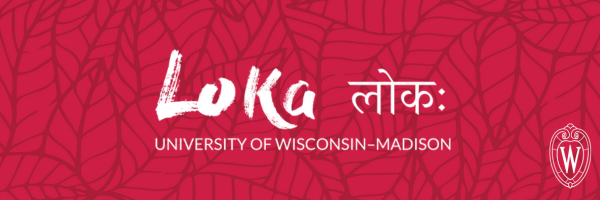
|
Dear friend,
Today’s full moon in August brings with it the Ricing Moon, which the Anishinaabeg of northern Wisconsin call Manoominike-giizis. It’s a time of great bounty, with harvest season in full swing and the promise of abundance all around us. We at Loka were lucky to host our dear friend and partner, Rev. Dr. Ben Lowe, who works with us on the Creation at the Crossroads project, in Madison last week. As the Executive Director of A Rocha USA, Ben is an environmental activist and author whose work reminds us of our connection and commitment to the Earth. His background, both as a scientist and a minister, informs his dedication to creation care. Read on for his featured interview this month – enjoy!
|
|
|

|
Dekila Chungyalpa
Director, the Loka Initiative at the Center for Healthy Minds
University of Wisconsin–Madison
|
|
|
|
|
|
Featured Interview
Q&A with Rev. Dr. Ben Lowe, Executive Director, A Rocha USA
|

|
|
|
|
Photo courtesy of Ben Lowe.
|
Since his first encounter with A Rocha as a Wheaton student in 2003, Ben has served on A Rocha staff teams and boards, nationally and internationally, most recently as Deputy Executive Director of A Rocha International. Originally from Singapore, Ben was the founding national organizer of Young Evangelicals for Climate Action and has served on the boards of A Rocha USA, A Rocha International, the Au Sable Institute, and Christians for Social Action. He is the author of multiple books and his work has been featured in media outlets including Audubon Magazine, Christianity Today, and The New York Times. He has a Bachelor of Science in Environmental Biology from Wheaton and a PhD from the University of Florida focused on the human, religious, and ethical dimensions of environmental change and conservation. Ben is based in the state of Florida, USA, where he can often be found kayaking on the Indian River Lagoon.
|
What issues are you working on as a faith and environmental leader that are the greatest priority for your community?
A Rocha USA is a Christian environmental conservation organization and part of a network of A Rocha organizations in about 25 countries around the world. Our mission is to live out God's call to care for creation and equip others to do likewise.
We believe that a lot of the environmental and ecological climate challenges that are facing our species in the planet today are driven primarily by our own species, and that we have a moral, spiritual, and theological responsibility to address them and to restore right relationships between us and our neighbors, both human and non-human. A Rocha focuses on figuring out how to live out this mission in local contexts and communities. We believe we are called to love this world, but we are too finite to love the whole world at once – that love must be put into action in specific places and times.
We have active conservation projects in Central Florida, the greater Austin area, and Nashville, Tennessee. We also nurture many partnerships in places like Oahu, Hawaii, and Washington state. In each of these locations, we proactively care for this world where we’re based. This includes removing invasive species, planting native plants, and restoring habitats. For example, our Florida team studies and monitors horseshoe crab populations in the Indian River Lagoon, one of the most biodiverse estuary systems in the country threatened by human development. In Oahu, we've partnered with the First Presbyterian Church of Honolulu to restore a 250-acre golf course they purchased when they outgrew their original space. The church congregation now meets in the clubhouse while we work together to restore the land for better use. In Central Texas, we are restoring habitat for species such as the endangered Golden-cheeked Warbler. After years of removing invasive species and planting natives, we've recently observed the warblers returning to a site after more than a decade of absence. Our work is not just for the good of the warblers or the horseshoe crabs or the manatees; it's also for human communities. Our Texas team runs a program called Picnics in el Arroyo, which provides outdoor experiences for Hispanic families who are new to the area. By organizing nature-filled days in local parks, we help these families—parents, kids, and grandparents—develop a sense of place and deeper connection to their new home and the ecosystems around them. It is a wide range of work – all focused on restoring a healthy, good relationship with the world around us.
|

|
Loka and A Rocha on the prairie! (L-R: Ben Lowe, Brittany Michalski, Ed Brown,
Dekila Chungyalpa, Mirtha Sosa Pacheco
|
The second part of our mission is to equip others to care for their local environments. We partner with churches and other Christian communities nationwide to help them figure out how to put environmental stewardship into practice where they are. We're a modest-sized organization, and with over 380,000 Christian congregations in the U.S., we know our work alone is just a drop in the bucket. That's why we partner with others who share our vision; this is where the Loka Initiative and the Creation at the Crossroads project has been a huge gift. Loka leverages the expertise of top scientists, thinkers, and practitioners from the University of Wisconsin-Madison to not only deepen our understanding of how we live in the world but also provide practical, tangible ways to put that knowledge into action within our faith communities. This is a partnership that means a lot to us and has meant a lot - a hospitable openness to sharing our best knowledge and wisdom for how to live faithfully in the world today.
|
How does your faith influence what you do?
Our faith commitments are the foundation for what we do. We believe we follow a God who created, loves, and sustains the world, and we know that God's heart for the world is one of love, care, and a desire for mutual flourishing. While every species was made in its own image, Christian theology teaches that humans were created distinctly in the image of God. This unique role allows us to reflect that image and represent God's will and intention for the world around us. We have rigorous, robust resources within our faith tradition that empower us to be caretakers of this world, which we believe doesn't ultimately belong to us, but belongs to God, and so what we're trying to do is learn to live that faith and that commitment out in very practical ways.
|
What do you think has been successful in your approach so far and where do you see challenges in your work?
The state of the world is deeply concerning. The rapid pace of environmental change and the impacts our communities are experiencing feel incredibly urgent. Our current trajectory as a society doesn't lead to a good future, and we feel a strong need for a course correction—both as a society and across our communities of faith. In the United States today, environmental, ecological, and climate change issues tend to be highly polarized along political and partisan lines. Some people, because of their political affiliations, may feel they don't have permission to care about these issues, especially when their political tribe is vocal in its disregard. Our goal is to say: this affects all of us. We all have the resources to care, and it impacts all of our lives. We believe that before these are political issues, they are moral, spiritual, and theological concerns. Reframing these issues as matters of faith and spirituality provides an invitation for everyone to care for our planet, regardless of their political identity or affiliation. In this way, we can transcend polarization and find the common ground to move solutions forward.
What is encouraging is that we can be a refuge for younger generations who feel deeply concerned, or even despairing, about the state of the planet. Many Christians haven't been more vocal about protecting God's creation, and we can provide a space for them to find refuge and community. For us, caring for the environment is not a separate issue—it's an essential part of being Christian. The reason we have fallen short is not because of our faith, but because we have not been faithful enough to it. The Church in the United States has significant influence and resources. We are working to unlock that potential to improve how we care for our neighborhoods and explore how churches can better steward their land, reduce energy consumption, and allocate their ministry budgets to become blessors of the created world.
|

|
A Rocha’s Texas team hosts a Picnic en el Arroyo. Photo courtesy of A Rocha USA
|
How do you personally deal with challenges and uncertainty and what are techniques that you find work for you?
This work comes with immense pressures and discouragement. We bear witness to great loss and destruction, and we must learn to grieve and mourn it well. Over time, I've learned not to shy away from lament and grief, and to process those emotions in community with others. I was drawn to this work out of a love for both the Creator and creation. I often feel closest to the Creator when I'm surrounded by the work of God’s hands, not just the works of human hands. In these moments, I am reminded that even though we have lost so much, there is still so much beauty and goodness in the world that is worth fighting for.
|
How can someone reading this newsletter support your work?
We're always looking for new people to join us in our work. Whether you want to serve, learn, or simply connect, we'd love to have you. We're also grateful for the support of Christians, churches, and all who believe in the important role they play. And we are always looking for more partners – our work is entirely collaborative, and we welcome anyone who wants to join us in our mission. You can get in touch by visiting our website, www.arocha.us.
Thanks to the Loka Initiative for providing a space to have these conversations and for being so hospitable to folks from our community.
---
Learn more about Loka's Creation at the Crossroads project here.
|
|
|
|
|
|
Share Updates & Stay Connected!
|
|
|
|
Hashtags: #LokaInitiative #Loka🌎
|
|
|
|
Loka is an interdisciplinary collaboration among different programs at the University of Wisconsin–Madison. It is housed in the Center for Healthy Minds in collaboration with:
The opinions expressed here are solely the author’s and don’t reflect the opinions or beliefs of
UW-Madison, the Center for Healthy Minds or their affiliates.
|
|
|
|
|